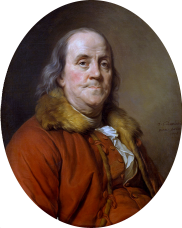
Benjamin Franklin Portrait by Joseph-Siffred Duplessis, used on $100 bill from 1929 until 1993. (wiki)
Ben Franklin was born in 1705. He was America’s first millionaire. Though he never served as President to the United States, his face is forever inked into our currency on the hundred dollar bill and recognized worldwide. He did, however, serve as a delegate to the Continental Congress from Pennsylvania. He is a famous inventor of useful, everyday items such as bifocals and the indoor toilet. He was also the first Post Master General, and in fact, the ‘founding father’ of the U.S. Postal Service.
Ben Franklin may be equally well known in some crowds for his many notable quotes. A few of these include “An investment in knowledge pays the best interest,” and “Early to bed and early to rise makes a man healthy, wealthy, and wise.” Yet my personal favorite is one that speaks to my own life’s passion – that of writing. For this passion was (and is) a journey that occurred because of one, small detour in my decision-making, and his quote says it all.
Either Writer Something Worth Reading
Or Do Something Worth Writing.
After working for years in executive sales roles – always searching for that next big commission check and never feeling fully satisfied – I ‘up and left’ the corporate world, deciding, instead, to try my hand at writing. This was a profession at the time that seemed both frivolous and vaguely out of reach. Yet now, five years later, I am thrilled with my job and have written a number of books, always with grand plans for another swirling around in my head.
Now, I may not (yet?) be a distinguished New York Times bestseller, but what does the title mean, exactly? Well, here is a quote from the blog “Hopes & Dreams” that describes quite well the origins of this literary behemoth in the world of writing:
Appearing for the first time in October of 1931, The New York Times list gave a humble rundown of the five top-selling fiction books and four non-fiction books in New York City. By 1942, The Times ranked sales in 22 of the country’s largest cities, gathering information from regional bookstores, department stores, and wholesalers.
Exactly which retailers they chose was not disclosed, in order to prevent publishing companies from artificially inflating numbers. Additionally, a sale of more than one copy to a single buyer was counted as a single copy sold. By the 1950’s, the list was on its way to being the marketing behemoth it is today, curating a list of the country’s most popular books.
Unfortunately, today the aspired-for credential of writing a book that becomes a New York Times bestseller has a certain self-induced stigma attached to it. For although The Times is still tight-lipped about which locations they obtain their numbers from, it is known that authors ‘launder’ their books through the system in order to inflate their sales numbers and ‘earn’ that esteemed status. This self-serving hypocrisy for the profession brings us back to the heart of what Ben Franklin said, and also to what this anonymous quote about writing so succinctly states.
To Write Means More than Putting Pretty Words on a Page;
The Act of Writing Is To Share
A Part of Your Soul with the World.
You see, for me and for many other writers, the journey of writing is a soul-searching, mind-bending, soul-altering, death-defying (all right, admittedly, that one may be a bit over the top), act of love and passion and truth. Pouring words onto a page is cathartic, charismatic, and captivating. Writing a full-fledged novel is giving birth to an idea and then watching it bloom as the story and characters unfold.
Editing one’s own work, particularly cutting out sentences, paragraphs, or, God forbid, even chapters, is equivalent to and sometimes as difficult as losing a piece of oneself. The phrase that best describes this soul-slashing was first coined by the illustrious William Faulkner, who said, “In writing, you must kill your darlings.” Stephen King followed up years later by stating, “Kill your darlings, kill your darlings, even when it breaks your egocentric little scribbler’s heart, kill your darlings,” in his famed book for writers, aptly named On Writing.
This is the passion that I have tried to impart to others, which is how my writing journey led me to write and to teach a Kids’ Creative Writing Class. For as much as I love writing novels, I get equally ‘fired up’ by the opportunity to share what I have learned. And just as Ben Franklin wore many hats – signer of the Declaration of Independence and of the Constitution, philanthropist, community leader, patriot, and Founding Father – I, too, have broadened my sphere of influence to write and teach. I enjoy teaching children, in particular, with their seemingly limitless imaginations and a joyous wonder about them that makes storytelling feel powerful, mystical, and unstoppable.
Class meets once a week for four weeks. I first review with students the five essential elements of a story: characters, conflict, setting, plot, and resolution. We then discuss the art of questioning each of those elements through the five basic questions: who, what, where, how and perhaps most importantly why. By the end of the course, they have a story with a protagonist and an antagonist, that is set someplace with details and imagery, where there is viable conflict and a definable story arc, and a final often magical ending. Their stories are each unique, and the opportunity to see their stories unfold is unforgettable.
The puzzle image captures the art and science of storytelling beautifully. I am especially drawn to it because my first blog focused on how the concept of creating a novel is akin to putting together a jigsaw puzzle. Every piece matters. There are no extra pieces. And each one fits together exactly as it should. I explain this concept to my students that it should be so with their words, scenes and chapters in a novel, as well.
I do believe that Ben Franklin had it right over three hundred years ago. And although I may not have this writing business all figured out just yet, I know that if you aren’t writing, living large is the ideal alternative. Even better though is passing on what you have learned: to share, teach, and incorporate what I refer to as ‘business humanity’ into your life and the lives of others. One final quote of Ben’s (yes, we are on a first-name basis now) to add here, that sums this up perfectly, is this:
Tell me and I forget, teach me and I may remember, involve me and I learn.
So, Dear Reader, what quotes inspire you, and which people in your own life journey have encouraged you to learn and grow over the years?


You, Crystal, have inspired me. I’m awed by your determination and energy to re-invent yourself, to break off from the safe and well-trod path to open yourself to the wonders but also unknowns of the Writing Life.
As to quotes, I guess it would have to be Faulkner’s statement “The past is never dead. It’s not even past.” That statement goes hand in glove with George Santayana’s statement “Those who do not remember the past are condemned to repeat it.” I guess Faulkner would say none of us are very good at remembering.
You are too kind! Reinventing ourselves seems to be more common these days, where we’ve left the era of staying in the same job… at the same company… until retirement. It’s not easy, though, I know! My path has been fraught with difficulties, challenges, and obstacles. I just happen to be someone who relishes those moments, so I can climb the mountain, charge through the brambles, and come out smiling and better for it, on the other side!
Hi Crystal:
Here’s one of my favorite quotes:
The best way to find yourself is to lose yourself in the service of others. Mahatma Gandhi
Thanks for reminding me of it!
Ev
Oh, that is a great one.
Unfortunately, I feel that we live in such a me-centered world of more, more, more! that such kind simplicities are forgotten (by myself, sometimes, too, I’m afraid). Thank you for sharing!
How to choose just one from the dozens of inspirational writing quotes taped all over my office walls :-)—this one, from Annie Dillard, currently keeps me working, at least:
“For how we spend our days, of course, is how we spend our lives.”